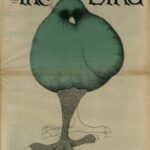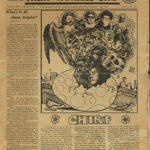What a Beautiful Thought I Am Thinking

The Great Speckled Bird launched in 1968, a year of protests and political contestation around the globe. In Atlanta, the founders of the paper felt it necessary to create an outlet for news that presented a point of view unavailable in the city’s other media platforms. The Bird served as a clearinghouse for information about and as a call to action for the interconnected social movements of the 1960s and 1970s, including civil rights, anti-Vietnam War activism, and women’s and lesbian and gay liberation. The paper also focused attention on subjects and news largely ignored or selectively covered by the city’s mainstream news media.
During the first week of Fall semester, Tom and Stephanie Coffin began distributing information against the war at Emory University. Within weeks a group of students, civil rights activists, and other like-minded people coalesced and decided to hold a weekly anti-war vigil at Emory and to produce a small broadsheet called the Emory Herald Tribune that would convey information about the war and opposition to it. Based on this positive response, a core group formed and expanded the Emory Herald Tribune into a booklet format called the Big American Review, which was distributed around the city, region, and college campuses. Approximately thirty young activists, including many who had a deep experience in the Civil Rights Movement, committed to establishing a multi- campus newspaper by November.
Despite the paper’s popularity and wide readership, it was controversial from the start and ruffled many feathers. Several high school students were suspended for selling the paper or possessing it on campus, the United States Postal Service refused delivery because of obscene content, printers refused to work with the Bird for fear that they would lose business, and outraged forces even firebombed the offices of the paper in 1972. Although it repeatedly went to court, the Bird prevailed and remained extremely popular among its readers and supporters.



